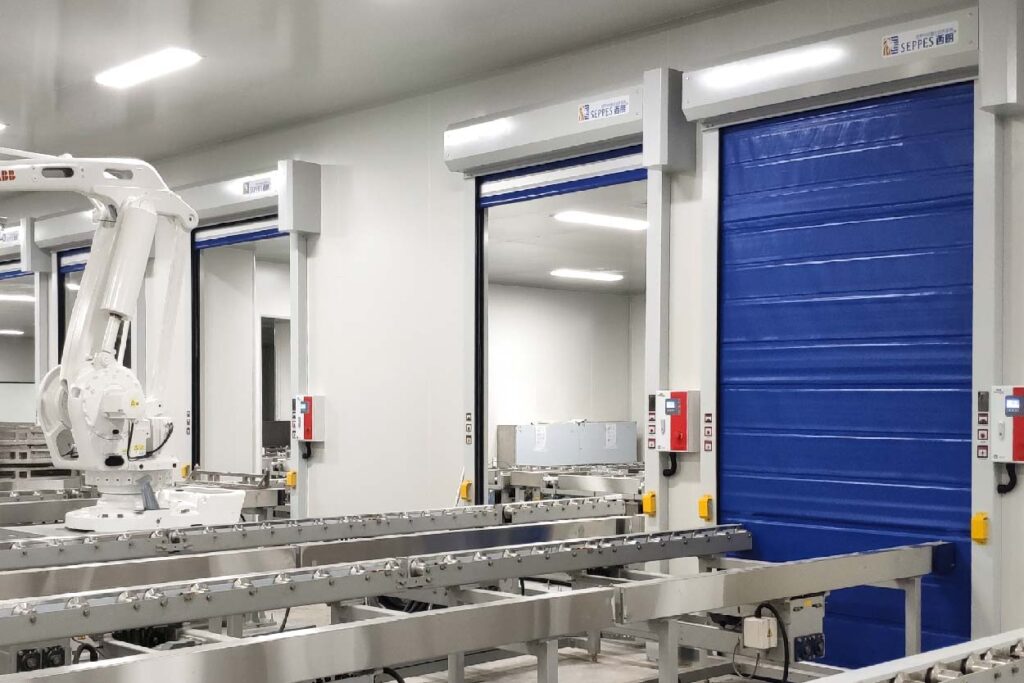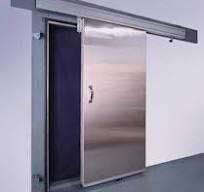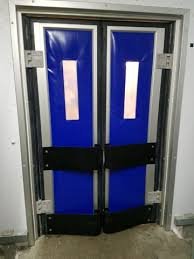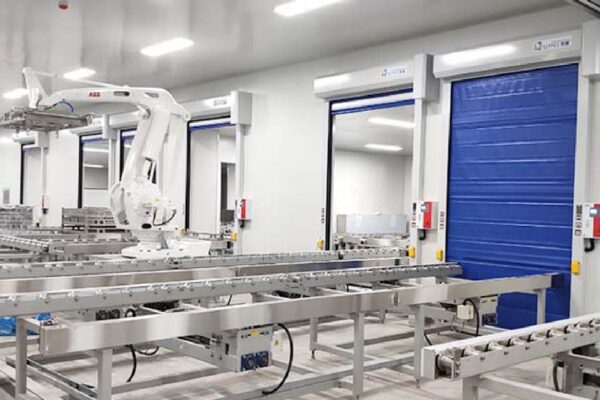In a refrigerated workshop, where ambient temperature control is critical to the quality of production and storage, Refrigerated Workshop Doors, as an essential part of a cold chain facility, can effectively guarantee temperature control and operational efficiency. How to choose the right door for a refrigerated workshop, and how they perform in real-world applications, is a central concern for industry users. This article will focus on these needs and answer your questions.
What is a Refrigerated Workshop Door?
A Refrigerated Workshop Door is an industrial door designed for low-temperature environments and is primarily used to keep internal temperatures stable and to prevent the entry of outside air. Its key features include:
隔热: U-values typically below 1.0 W/m²K.
Hermetic sealing: reduces air infiltration and optimizes energy efficiency.
耐用性强: adapts to low temperatures and high-frequency operations.
These doors are widely used in cold chain logistics, food processing and pharmaceutical storage.
Main types of refrigerated workshop doors
High speed insulation door

适用场景 frequently opened refrigerated interiors, loading and unloading areas.
特点 fast opening and closing (speed 0.8-1.5 m/sec), reducing cold air loss.
材料 Multi-layer composite material with excellent heat insulation performance.
Sliding Refrigerataed Doors

场景 Large sized doorways, long term sealed storage areas.
特点 Mechanical sliding design to ensure high sealing.
材料 PU foam core, aluminium alloy shell.
Flap Refrigerated Doors

场景 Higher doorway, suitable for cold storage and warehousing centers.
特点 Sectional opening, good heat preservation.
材料 High density steel plate with thermal insulation filler.
Application Scenarios for Refrigeration Workshop Door
Food Processing Plant
Requirements: Reduce temperature fluctuations and maintain food freshness.
Recommended Door Body: Insulated High Speed Doors to ensure fast entry and exit.
Pharmaceutical Workshop
Requirements: Comply with GMP standards, strictly control environmental pollution.
Recommended Door Body: Sliding Cold Room Doors, providing a long-lasting seal.
Logistics Sorting Centre
Requirements: Improve loading and unloading efficiency, reduce energy waste.
Recommended door body: flap type cold storage door, suitable for multi-scenario operation.
Why Choose Refrigerated Workshop Door?
Efficient temperature control: Reduces cold loss and energy consumption.
Increased productivity: fast opening and closing design optimises logistics.
Regulatory compliance: Ensures safe storage of food and pharmaceuticals.
How do I choose the right Refrigerated Workshop Door?
Evaluate Temperature Control Needs
Do you need to open quickly and frequently?
Do you need to maintain a low-temperature seal for extended periods of time?
Understanding Technical Parameters
Does the insulation (U-value) meet standards?
Is the door material frost and water resistant?
Choose a reliable brand
SEPPES: offers a wide range of refrigerated door solutions and supports customization.
Hörmann: German premium brand specializing in door sealing technology.
ASSA ABLOY: The world’s leading supplier of door systems.
Application Examples
Case 1: Efficiency gains in a food processing plant
A food processing plant adopts SEPPES’ high speed insulated doors to reduce cold air loss through rapid opening and closing, saving energy costs by 30% per year.
Case 2: Environmental Optimisation in Pharmaceutical Cold Storage
A pharmaceutical company uses sliding cold storage doors to ensure that pharmaceuticals are stored in a stable environment at -20°C, increasing the product qualification rate by 20%.
Future Trends
Intelligent control: integrating AI and IoT technologies for real-time monitoring.
More efficient materials: develop new insulation materials to further enhance energy efficiency.
Global demand: With the growth of the cold chain industry, refrigerated truck bay doors will see wider application.
常见问题
Q1: What is the lifespan of Refrigerated Workshop Door?
Usually 10-15 years, depending on frequency of use and maintenance.
Q2: What factors should I look for when choosing a Refrigerated Workshop Door?
Key factors include insulation, speed of opening and closing, and durability.
Q3: Does it support customised service?
Most suppliers offer a number of customisation options such as size, colour and material.
Q4: Which brands are recommended?
Brands such as SEPPES, Hörmann, and ASSA ABLOY offer high-quality products and services.

